MercoPress. South Atlantic News Agency
Tag: Marcos Peña
-
Tuesday, June 14th 2016 - 09:04 UTC
Macri's coalition trips in a mayoral race and suffers unnecessary exposure

Mauricio Macri's ruling coalition, “Let's Change” suffered its first electoral defeat since winning the presidential runoff last November, at a mayoral competition in the city of Rio Cuarto, Córdoba province last Sunday.
-
Tuesday, June 7th 2016 - 08:11 UTC
Almagro accuses Macri of reversing campaign promises in the Venezuelan situation
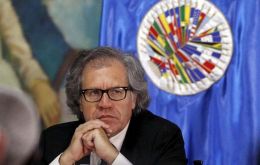
After directing criticism at Venezuelan President Nicolas Maduro and urging that Caracas be considered for suspension from the Organization of American States (OAS), Luis Almagro has accused Argentine President Mauricio Macri of impeding those efforts and of reversing his campaign promises of taking a hard line against Maduro.
-
Thursday, May 26th 2016 - 05:03 UTC
Macri's government in “100% agreement” with the Church's dialogue message
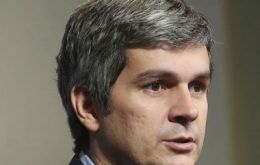
Argentina's cabinet chief Marcos Pena said president Mauricio Macri administration was “100% in agreement” with the Catholic church 25 May Day message “to leave aside statistics, think in the Argentine people and not fight among ourselves”.
-
Wednesday, May 25th 2016 - 06:50 UTC
Macri's administration admits the Catholic church criticism of Argentina's 'labor market fragility'
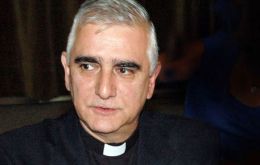
Leaders from Argentina's ruling “Let‘s Change” (Cambiemos) administration acknowledged on Tuesday that the country is “going through the worst time” yet since president Mauricio Macri took office but also underlined all the measures that have been taken over the last few months to overcome the situation.
-
Friday, May 20th 2016 - 10:05 UTC
Macri in the threshold of a major political storm over a possible veto of a labor bill

Argentine president Mauricio Macri is expected to veto a controversial labor bill which was approved early Thursday after a marathon session in the Lower House of Congress. The bill passed with 147 votes in favor, 3 votes against it and 88 abstentions includes the declaration of the employment emergency during 180 days and a double compensation in the event of layoffs, for a period of six months.
-
Friday, May 13th 2016 - 11:30 UTC
Argentina supports the institutional situation in Brazil, but fears effects of the neighbor's recession

The Argentine government publicly showed its support for the new status quo in Brazil, minutes after the country’s vice-president, Michel Temer, temporarily took power after President Dilma Rousseff was suspended from office after the Senate voted to open impeachment proceedings against her early yesterday morning.
-
Monday, May 9th 2016 - 07:14 UTC
Jobs, layoffs and severance payment at the heart of Argentina's public debate
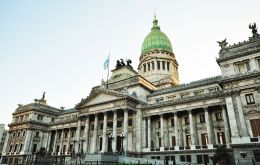
Unemployment and jobs are in the heart of public debate in Argentina. A public opinion poll released last week revealed that 48.3% of Argentines fear he/she or a relative might lose their jobs in the next six months.
-
Saturday, April 30th 2016 - 12:12 UTC
Argentine unions take to the streets to protest job cuts and inflation
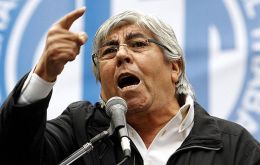
Argentina’s strongest unions brought thousands of people into the streets Friday to protest high inflation and job cuts in the biggest demonstrations against President Mauricio Macri since he took office in December. Demonstrators waving blue and white Argentine flags flooded the main avenues of Buenos Aires, blocking traffic in a protest that brought together rival unions that put aside differences to protest Macri’s policies.
-
Friday, April 29th 2016 - 05:44 UTC
Mercosur unmoved by Rousseff''s invocation of the “democratic clause”

“We respect the Brazilian constitutional process” and thus Argentina does not have plans to follow on president Dilma Rousseff announcement that she will appeal to Mercosur to implement the “democratic clause” if the impeachment process to remove the head of state from office advances in the country's Senate.
-
Saturday, March 19th 2016 - 05:54 UTC
Argentina concerned about Brazilian political situation's impact on bilateral trade

The Argentine government expressed its concern about the impact the Brazilian political crisis will have on trade between the two countries. Argentina and Brazil are the principal partners in the Mercosur common market, which also includes Paraguay, Uruguay and Venezuela. Brazil and Argentina are mutually principal destinations for their manufactured goods, meaning that bilateral trade is crucial for both.
